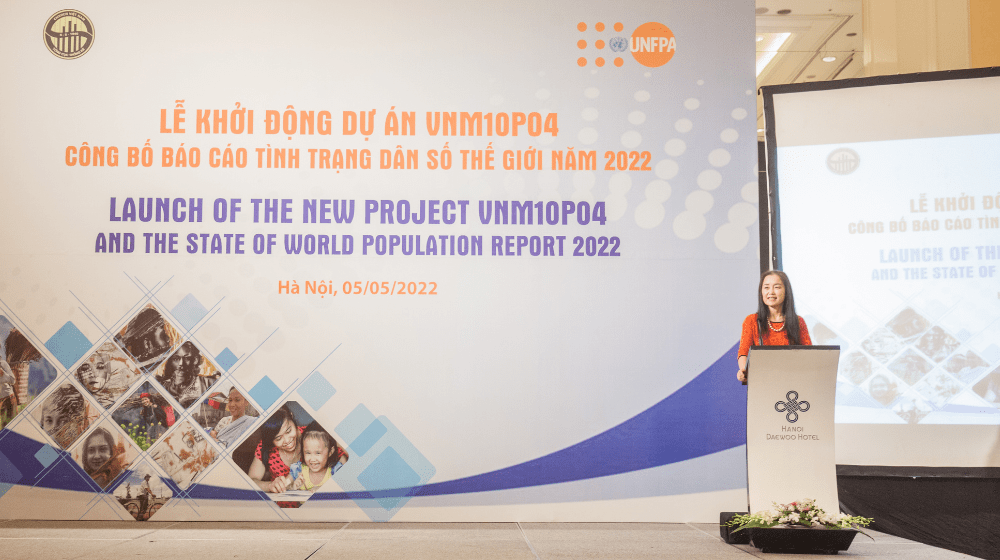Ms. Nguyen Thi Huong, Director General of General Statistics Office;
Representatives from the National Assembly, MPI, MOJ, MOH, MOHA, MOLISA, MOCST, MOET, and other line-Ministries;
Representatives from embassies, international and local NGOs, UN colleagues and the media;
I am very pleased to be here today to launch the project “Supporting Viet Nam in the production and utilization of quality population data and evidence for the evaluation, formulation and implementation of the country's socio-economic development policies, strategies, plans and monitoring of Sustainable Development Goals”, with a total budget of USD1.9 million for five years from 2022 to 2026 and also to release the UNFPA’s flagship report for Viet Nam, the State of the World Population 2022, entitled "Seeing the Unseen: The case for action in the neglected crisis of unintended pregnancy”, which was launched globally on 30 March 2022.
As we gather here today, I would like to thank the General Statistics Office,
particularly Mme Huong, Director General herself, for such commitment and dedication for Vietnam’s data for development. On this occasion, I wish to sincerely congratulate the GSO for the 76th anniversary of the establishment of the GSO tomorrow (6/5/1946 – 6/5/2022) – Happy Birthday, GSO! I would also like to thank co-implementing partners, including the Department of Civil Status, Nationality and Authentication of the Ministry of Justice, and the Social Department of the Parliamentary Committee for Social Affairs for the partnerships and efforts to design this new project together.
Dear participants,
Viet Nam is in the midst of rapid transformation for its socio-economic growth. The country has been implementing the Socio-economic Development Strategy (SEDS) 2021-2030, the Socio-economic Development Plan (SEDP) 2021-2025, and the National Plan of Action to achieve the Sustainable Development Goals (SDGs) by 2030. Just like other countries in the world, COVID-19 has taken a heavy toll in Viet Nam on socio-economic development, as well as on population shifts with regard to mortality, fertility, and migration. In this context, reliable and quality statistics is fundamental to formulate, implement, monitor and assess the country’s progress to achieving socio-economic and SDGs targets.
The 2030 Agenda stresses the importance of having high-quality population data. Our commitment to leaving no one behind means everyone must be counted for, so everyone can be reached, including those furthest behind, and quality, reliable, consistent and comparable data is a crucial element in making this a reality.
UNFPA is now entering into the new tenth country programme and GSO is one of the most important partners for UNFPA Viet Nam. As we always say, countries with quality data are the ones which achieve impressive socio-economic growth. Better Data, Better Lives.
Dear participants,
Let me move into the second item for today’s event, which is to release for Viet Nam the 2022 State of the World Population Report entitled “Seeing the Unseen: The case for action in the neglected crisis of unintended pregnancy”. The report highlights the seriousness of unintended pregnancies and their harmful consequences in sustainable development. Globally, nearly a quarter of women are unable to make decisions about their own health care, and nearly 10 per cent are unable to make decisions about contraception.
Is it any wonder then, that of all pregnancies in the world, nearly half are unintended?
For the women affected, the most life-altering reproductive choice – whether or not to become pregnant – is no choice at all. No country is spared. Unintended pregnancies take place in everywhere, including in Viet Nam.
The SDGs survey conducted by Viet Nam’s General Statistic Office in 2021 in collaboration with UNFPA and UNICEF showed that only 72.2% of married women are satisfied with modern contraceptives, and this percentage even drops further to 50.3% for unmarried women. The problem seems to be acute among young people, whose unmet need for family planning is estimated 4 times higher than married women.
In terms of women’s ability to make decisions on fertility and sexual intercourse, 84.8% of Vietnamese women, on average, decided on their own on sexual intercourse, and 70.4% on the use of contraceptives. However, only 42.6% of Hmong and 61.4% of women without education or with pre-primary education made decisions on sexual intercourse on their own. For the decision on contraceptive use only 25.5% of teenagers and 54.2% of young people aged 20-24 could do so.
This is a recipe for unintended pregnancy, and it is part of an unseen crisis unfolding right before our eyes everywhere in the world including Viet Nam.
With unintended pregnancies, women and girls often delay or discontinue schooling, or drop out of the workforce, with lifelong impacts on their earnings, health and welfare. These consequences ripple across generations.
Today and every day, we are calling on policymakers and community leaders to prioritize women’s and girls’ rights, to expand their choices including universal access to safe and effective contraceptives and to make sure that every young person–yes, boys too – is fully aware of the risks of and means of avoiding unintended pregnancies. We need to listen to the voices of women, better understand their needs, and echo their calls for equality in every sphere.
The 2030 SDGs call for ending unmet need for contraception, achieving gender equality and advancing bodily autonomy. We must redouble our commitment to achieve these goals, and we must add to our priorities the prevention of unintended pregnancies.
Thank you for your participation and engagement!


